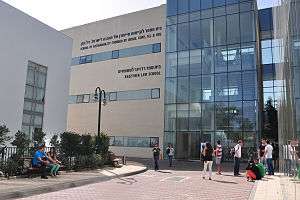Radzyner Law School
Harry Radzyner Law School at the Interdisciplinary Center in Herzliya was established in 1994.
| Deans |
|
| Harry Radzyner Law School | |
|---|---|
| Established | 1994 |
| School type | Private |
| Dean | Prof. Amnon Lehavi |
| Location | Herzliya, Israel |
| Enrollment | 1,400 |
| Website | |

Background
Harry Radzyner Law School at the Interdisciplinary Center in Herzliya, Israel, was established in 1994 by Prof. Uriel Reichman with the help of Dr. Harry L. Radzyner, and is the Interdisciplinary Center’s founding school.[1] The first class of the combined Law and Business Program completed its studies in 1998. By 2017, approximately 7,300 graduates completed their studies at Harry Radzyner Law School.
International collaborations
Harry Radzyner Law School maintains international collaborations in several levels: each year renowned visiting professors from some of the foremost law schools in the world teach legal courses in English at the school; the students at the school participate in various international activities throughout their studies, such as student exchange programs, joint seminars with foreign law schools and more. In addition, Harry Radzyner Law School is the only Israeli law school that is a founding member of the Law Schools Global League.[2] The Law Schools Global League is an alliance between over 20 leading law schools from across the globe, promoting collaborations in studies and research in light of globalization and its impact on the legal world.
Study program
Undergraduate degree
Harry Radzyner Law School offers several dual degree programs (LL.B and B.A.): Law and Business, Law and Government and Law and Psychology. In addition, the school offers special LL.B. programs with a "direct route" to the M.A. in Financial Economics, MBA, or M.A. in Government, and the Lala Tusk – Radzyner Honors Program for outstanding students.
Harry Radzyner Law School has developed a legal clinic program[3] in which law students take part in one of 14 legal aid clinics and provide legal assistance to individuals in need and disempowered groups. The various clinics at Harry Radzyner Law School work in collaboration with public institutions, non-profit organizations, private law firms, government offices and more.
Graduate degree
Harry Radzyner Law School offers a graduate program in law (LL.M.), with a specialization in business law. In addition, the school offers a research LL.M. program for outstanding students, including a thesis track. Students admitted to the program receive a full scholarship.
Law & Business Journal
The Law & Business Journal was founded in 2004 and is Harry Radzyner Law School's law journal. The journal is published annually in two volumes: the first is a collection of articles dealing with a variety of topics in the legal field, and the second is a collection of legal articles in one or several specific fields, selected from the articles that were presented in conferences held by the journal.
In addition, the journal manages a website that offers readers free access to the online versions of the articles published in the journal in full text, as well as news updates from the legal world and regular updates on events and conferences sponsored by Harry Radzyner Law School.
Bar Tests
This year, graduate students from the Harry Radzyner Law School, rank fourth among private law schools and seventh overall with 56% passing rate. In the fall of 2014, the bar association decided to make the test harder to raise the admission level required to enter the profession, and indeed, only 34% of those who took the test in June 2018 managed to pass it, a significant setback from the more usual 70%-80% of past years. Two law schools managed to keep the highest percentage of admitted students, namely Tel Aviv University Law (70%), The Hebrew University Law (71%)
Zvi Meitar Institute for Legal Implications of Emerging Technologies
Zvi Meitar Institute for Legal Implications of Emerging Technologies at the Harry Radzyner Law School at IDC [4], was established by the generous donation from the Zvi and Ofra Meitar Family Fund, and is broadly interested in looking at the ethical, legal and social implications of new and emerging technologies. The Institute, directed by Dr. Dov Greenbaum, is focused on the promotion of innovation and technology, and aims to provide background and directions regarding new and emerging technologies such as policy, laws, regulations and the like that are designed to promote rather than hinder new innovation. The Institute holds symposiums, round-table discussions and conferences with local and international experts on areas of interest to the Institute. Furthermore, the institute has a unique program, the Zvi Meitar Emerging Technologies program, which provides eighteen exceptional students from all the IDC schools an opportunity to go through academic training in the field of science and technology.
References
-
"IDC's Combined Degree in Law and Business". Jewish Press. 2013-10-21. Archived from the original on 2013-10-21. Retrieved 2013-11-19.
Prof. Sharon Rabin-Margalioth, Dean of the Radzyner School of Law at IDC Herzliya has studied law on both sides of the Atlantic Ocean. “In business, local expertise is insufficient; there is a growing need for international business law expertise and the ability to cope with the challenges of globalization. That’s why we’ve established an innovative new program that provides students with significant added value in law and business.”
- "Archived copy". Archived from the original on 2013-10-24. Retrieved 2013-10-30.CS1 maint: archived copy as title (link)
- "Archived copy". Archived from the original on 2013-10-20. Retrieved 2013-10-30.CS1 maint: archived copy as title (link)
- https://www.idc.ac.il/en/research/zmi/pages/main.aspx